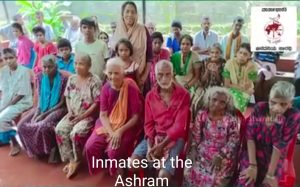– Mohammed Atherulla Shariff
The first supplication I make every morning is ‘let no inmate of our ashram go hungry’ is the humble wish of Ayesha Banu, who runs a home for the destitute at Jarigudde Salmara, a small town in Karkala Taluk of Udupi district in coastal Karnataka. Around seventy persons aged, handicapped, mentally retarded men and women destitute are being looked after in Suraksha Sevashrama, meaning Safe Service Shelter run by Ayesha Banu singlehandedly.

With deep love and affection, she personally attends the inmates individually. Hair dressing, bathing, nursing and feeding are her daily routines. Caste, religion, region or language have no significance when it comes to helping the hapless people deserted by their loved ones. Currently none of the inmates belongs to her community.

Interestingly a piece of land measuring 45 cents was purchased by her in order to build a house for her family. But things changed, and the destitute home emerged on the scene. Ayesha’s family resides in a just 3 cents piece of land. It all happened 10 years before.
Ironically, Covid-19 period brought Suraksha Sevashrama into limelight. For the preceding six years hardly anybody knew about it. But the hardships during Covid-19 compelled Ayesha to seek police help to procure provisions for the inmates. The police authorities were kind enough to help after visiting the ashram. They made a public appeal on social media to help the ashram. The kind hearted people extended helping hand. Presently there are five ambulances in the ashram.
She gets phone calls from public and police as well, says Ayesha Banu, informing about the helpless persons lying in bus shelters and on footpaths under open sky. Madame Ayesha reaches there the next moment and takes them under her motherly care. With the help of her daughter and son-in-law she even picks up the unclaimed dead bodies and performs their last rites and sends them to their final abode respectfully.




